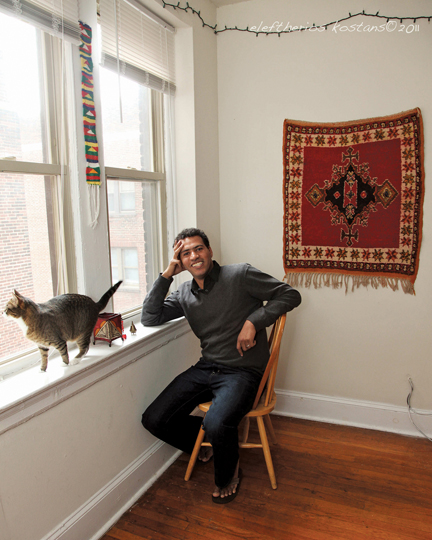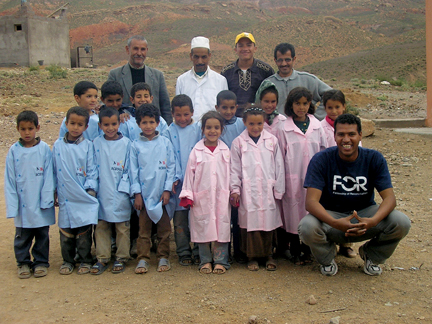Learning to Read and Write: Understanding the Benefits of Education

In recognition of Brahim El Guabli’s literacy efforts in Morocco, he was an invited participant in the U.S. State Department’s International Visitor Leadership Program. He looks forward to having his Swarthmore Arabic language students become involved in the High Atlas project.
At 20, Brahim El Guabli—having recently completed training as a bilingual teacher—was assigned to teach school in a tiny village in the High Atlas Mountains in southern Morocco.
“Conditions were bad. Sometimes, children wouldn’t come to school because they didn’t have a pen or a pencil or a notebook,” says El Guabli, now 33 and a lecturer in Arabic language and literature at the College.
Determined to bring about change in Moroccan attitudes toward education and literacy, El Guabli founded the organization Education and Solidarity in the High Atlas (AESHA) with the goal of establishing stronger ties between communities and schools and of persuading the children’s parents of the value of education. (READ: El Guabli’s first-person account of the AESHA project)
As president of AESHA, he initiated the Moroccan Literacy Project four years ago, and, in partnership with a friend and colleague, set out to engage civil activists and educators like himself to make parents aware of the benefits their children would have by attending school regularly and learning to read and write.
“Our idea was very simple—” he says, “to design a project that would help decrease the school dropout rate, promote girls’ education, and provide a propitious learning environment that takes into account the needs and problems of rural students, whose lives are very hard.
“In fact, the problems of the region are such that the Moroccan government has identified the villages in this area as a priority zone of the National Human Development Initiative.
 “Over time, parents came to understand that the only way for their children to have a better life and social advancement is through an academic education,” El Guabli says.
“Over time, parents came to understand that the only way for their children to have a better life and social advancement is through an academic education,” El Guabli says.
Despite growing up in a country where academic education was not particularly valued, El Guabli, a native of the town of Ouarzazate in southern Morocco, was always a passionate learner. His parents never attended school, but they supported and encouraged their son, impressing upon him the importance of education. Many parents in Morocco keep their children home from school so that sons can help their fathers at work and daughters can assist their mothers with household chores.
“My parents never made me work. They told me that school should always come first,” he says. “By the time I reached middle school, I’d decided I wanted a career in teaching.”
Since his first job at age 20, El Guabli has taught Arabic, Berber, French, and English at all levels, from primary to university undergraduate in Morocco and abroad. He has a master’s degree in applied foreign languages from the University of Bordeaux, France, and currently, he’s finishing up a second master’s at the Sorbonne, after which he’ll pursue a Ph.D. in Arabic literature and Islamic studies in the United States.
By the time El Guabli left the High Atlas region, he and his network of colleagues had provided help to more than 20 villages. He is still active in the planning, advising, and strategizing of the literacy project, which, in the meantime, he says, has spread to approximately 70 villages.
 Email This Page
Email This Page